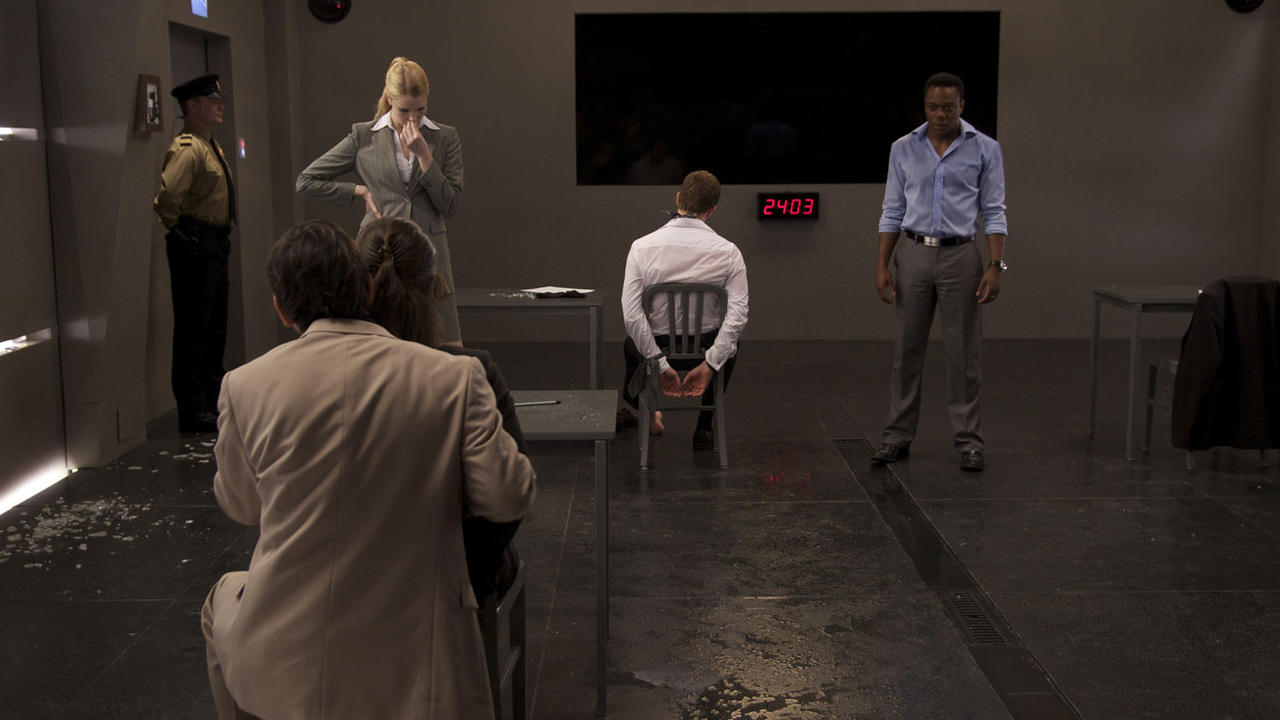
Exam (Stuart Hazeldine, 2010, 101 min.)
Eight applicants have eighty minutes to answer one question. There’s only one problem: nobody knows what the question is. In a small conference room, the Invigilator (Colin Salmon) explains the terms of this Kafkaesque test; the successful applicant will get the job of a lifetime, and although we might assume that unsuccessful candidates just leave disappointed, the Invigilator does remind them that “There is no law in this room but our law.” Each has a blank piece of paper and a pencil with no eraser. If they spoil the paper, they’re out. If they talk to the Invigilator or the armed guard at the door, they’re out. If they leave the room voluntarily, they’re out. What follows is an ultra-low-budget but handsomely mounted cross between Cube and Twelve Angry Men, with some script input by mystery writer Agatha Christie and literary critic Terry Eagleton, played out on a single-room set borrowed from one of the middle Star Trek series.
The eight applicants are a cross-section of British demographics, given nicknames early on: White (Luke Mabley) is a cocky Cockney bully; Brown (Jimi Mistry) is a gambler and a cynic; Black (Chukwudi Iwuji) is a fan of working collectively; Dark (Adar Beck) is a shrewd judge of character; Blonde (Nathalie Cox) is mostly quiet; Brunette (Pollyanna McIntosh) is assertive; Deaf (John Lloyd Fillingham) is a quaking, sniveling, battered nutjob; and Chinese (Gemma Chan) gets tossed first because she thinks she’s supposed to write a cover letter on the paper. They test the limits of the rules, flexing their characters as they fall into a sort of ad-hoc committee of mutually distrustful backstabbers. One by one, they’re eliminated, the stakes and tempers rising as the clock ticks down.
It’s essentially a stage play for sci-fi and language nerds, as the characters, given a set of rules at the outset, analyze the Invigilator’s opening statement as a whole, word by word, sentence by sentence, clause by clause, trying to use it as a behavioral guide and a clue as they attempt to figure out the elusive question. They make alliances among themselves, then break them; reveal clues about themselves that sometimes turn out to be lies; and gradually forget basic rules of polite interaction as their desperation grows. This must be a hell of a job.
I will admit that it was compelling viewing, at least most of the time. I “had it all figured out” from the first couple minutes, but of course I had to keep revising “it” as the film progressed, since I was wrong most of the time. Writer-director Stuart Hazeldine, cinematographer Tom Wooster, and editor Mark Talbot-Butler skillfully employ their tiny set to pump up the claustrophobia and tension, and the single set never seems too limiting. The actors are all decent, although Dark’s affected American accent is distracting. The real problem is the script, which wants to be an airtight logical puzzle disguised as a thriller but keeps breaking its own rules and forgetting events from earlier in the film. These problems aren’t fatal to the film, but they greatly reduced its overall effectiveness.
I think it was the arbitrary enforcement that got to me most, and I don’t think I’m being needlessly nit-picky, especially when I’m dealing with a film that’s hyper-picky. I’ll just use two examples. First, although they’re instructed that they’re out if they “spoil” their paper, there’s no clear definition of “spoil” in use. If you tear it or burn it, you’re out; if someone else tears yours, you’re still in. But you can drench your paper with gallons of water or fold it tightly and stuff it under your shirt, too; I’ll accept that the latter isn’t spoliation, but the former? Come on. Soak a piece of paper and tell me it’s not spoiled. Second, if you address the guard or the Invigilator, you’re out. One character looks into the security camera and chastises it for lack of humanity, and that character gets tossed. But nobody knows who, if anyone, is on the other end of the camera, and we certainly don’t know that the Invigilator is there, or that the character was addressing him. That’s a weak point on which to rule, but I guess the opening “There is no law in this room but our law” gives the script pretty wide leeway to bend the rules. And then there’s the issue of the voice-activated lights, which seem to exist only to play a part in the finale…
The other weakness is the late-introduced sci-fi element, which leads to both logical and dramatic flaws. We learn that there’s a pandemic going on, and that the hiring company manufactures a drug that arrests the disease’s progress. It feels like it’s only in there so one character, who has the disease, can have an attack during the film for dramatic effect. But it introduces so many problems: how can you take a pill “every hour on the hour” and still live a normal life? Haven’t they thought of the need for sleep, or the invention of time-release capsules? In a room that size, how can anyone hide the need to take a pill? And if you felt someone steal your only pill, why would you keep quiet about it?
For much of its running time, Exam was a thrilling, confounding lark. I formed and discarded at least five “definite” solutions to the enigma, and I have to admit that I absolutely loved the question and its answer when finally revealed. But the script needed another revision, tossing out the sci-fi element and strengthening the relationships between the characters and the traits that led them to this room. It would have been simple, I think, to write those flaws out and create a more abstract but ultimately more satisfying film.

